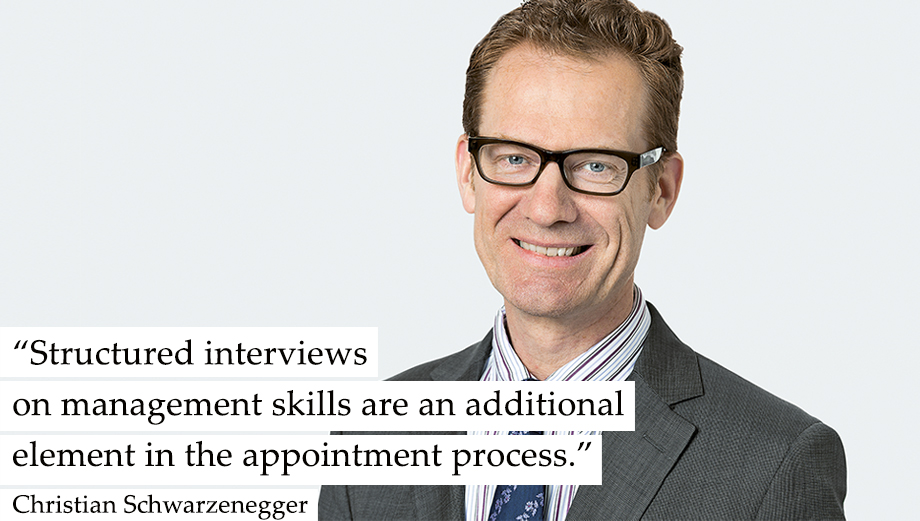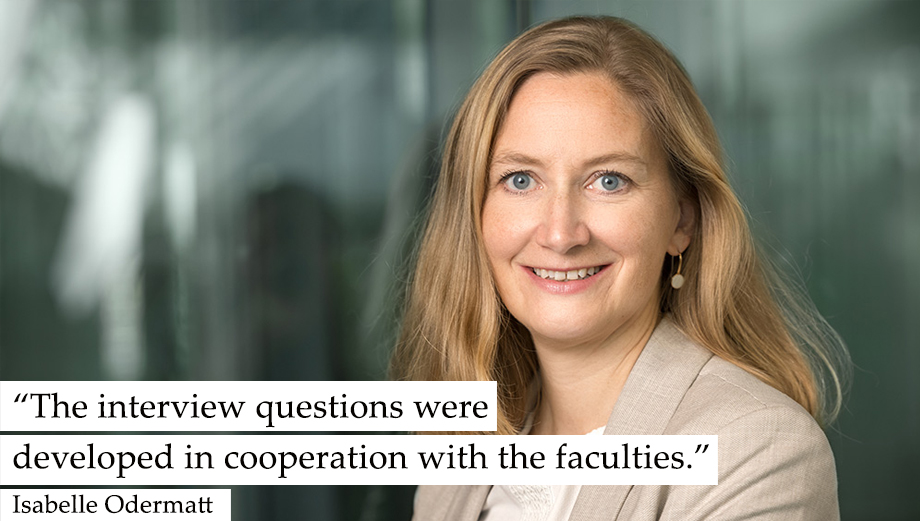Navigation auf uzh.ch
Navigation auf uzh.ch

Choosing who will be appointed to a professorial chair is one of the most significant and difficult decisions a university has to make. These decisions can set the course of a department or faculty for many years to come. “Considering our appointment will hold the chair for about 25 years, it is our responsibility to select candidates that can live up to the many various demands of their role,” says Christian Schwarzenegger, who as Vice President Faculty Affairs and Scientific Information oversees most appointment negotiations at UZH.
It goes without saying that a renowned research university such as UZH strives to recruit candidates who have an outstanding track record in research and teaching. But transferable skills such as social skills and leadership skills also matter.
Professors have a wide range of leadership and management tasks. They are their employees’ primary contact, and often accompany them from the moment they join UZH until they leave. They are responsible for creating good working conditions, resolving conflicts, motivating their team, and supervising their PhD candidates in a way that furthers their careers. Moreover, many professors also head up a department, institute or faculty, and hold roles on various committees.
“Working environment, employee satisfaction and also academic output greatly depend on how a team is managed,” Schwarzenegger explains. The University Statutes explicitly state that appointment procedures must also take into account a candidate’s management skills. But how is it possible to know if someone is a good motivator, or a responsible team leader?
A pilot project launched at UZH in 2018 shows a possible way: In addition to the actual appointment interviews, so-called structured interviews lasting between 20 to 30 minutes are held. Candidates are asked, for example, about their past behavior as managers in certain key moments, or how they would react in a specific hypothetical situation. The interviews also cover the candidates’ willingness to promote UZH’s academic self-administration beyond their own chair.
To be able to compare the answers, all candidates in an appointment procedure are given the same questions in predetermined order – hence the name structured interview.
In terms of content, the project is led by Jörg Kehl, who heads the Professorships Department, while Martin Kleinmann and his team member Isabelle Odermatt are responsible for the scientific side of the project. Kleinmann, professor of work and organizational psychology, is a proven expert in aptitude testing. His research focuses on selection and recruitment processes in businesses and organizations.
.jpg)
Structured interviews are a well-thought-out and now well-researched tool that is used in many organizations. The interviews require less work than drawing up an assessment. But even so, to get meaningful results the interviews need to be prepared and carried out carefully and under scientific supervision.
The interviews are based on a comprehensive collection of questions developed specifically for use at UZH by the involved faculties in cooperation with Isabelle Odermatt.
They first compiled a list of specific situations that occurred at UZH. “We asked employees at all levels in the faculties to describe situations that were particularly challenging for professors in their management roles – and that were solved particularly well or particularly badly from a leadership point of view,” explains Odermatt. Based on these cases, they developed interview questions focusing on management behavior.
To validate the interviews, several hundred managers were asked to share how they would respond to the questions. Their employees were then asked about their job satisfaction. The findings, according to Kleinmann, were highly consistent: The teams whose line managers had performed best in the interviews also gave the most positive responses.

Expert Isabelle Odermatt supports the faculties and professorial appointment committees not only in preparing, but also in conducting and evaluating the structured interviews. Together with the committee members, she sets out the management topics that are of particular relevance for each professorship and that need to be covered in the interviews. She also supports the members in ranking the candidates’ responses from various perspectives.
The final discussion of the findings is held behind closed doors by the members of the appointment committee, who decide how much weight should be given to leadership and management skills. “The candidates’ specialist qualifications are still the key criteria when appointing new professors, and we discuss these in the actual appointment interview,” explains Christian Schwarzenegger. “The structured interviews on management skills are an additional element. They help the professorial appointment committees reach as informed an opinion of the candidates as possible.”
Not all of UZH’s faculties were involved in the project. The Faculty of Business, Economics and Informatics decided to take a different approach. “The rigid question-and-answer structure is a stark contrast to the open-ended format of the appointment interview itself,” explains Harald Gall, dean of the Faculty of Business, Economics and Informatics. “That doesn’t mean that we don’t consider social and leadership skills when appointing new professors, on the contrary. But we’ve had good experiences with discussing these skills in the existing context of appointment interviews – taking into account the type of professorship and the candidates’ experience. We also believe it’s very important to promote management skills throughout professors’ careers,” says Gall.
Klaus Jonas, who until the summer of 2021 was dean of the Faculty of Arts and Social Sciences, has had good experiences with the pilot project. “Structured interviews reveal more about a person’s social and leadership skills than open-ended interviews. They provide additional information that you often miss out on in open-ended interviews, and you get a more comprehensive picture of the candidates’ strengths and weaknesses,” he says.
The professor of social and business psychology’s research focuses on the link between good leadership and research productivity. His research suggests that good management has a positive effect on the scientific output of research teams. “By taking into account management skills during professorial appointment procedures, UZH is also promoting scientific productivity,” he says.
Katharina Michaelowa, the new dean of the Faculty of Arts and Social Sciences, is open to get to know the new approach. “A systematic assessment of a person’s leadership and management skills has its benefits. But the process is very time-consuming compared to the time spent on the key questions about research and teaching.” Some people in her faculty have thus also voiced their reservations, with some wondering whether structured interviews aren’t too formal and bureaucratic. Based on these objections, the Faculty of Arts and Social Sciences worked together with Kleinmann to make a few adjustments to the process, and feedback has been positive. “We’re now ready to test whether the new approach pays off.”
The pilot project to assess candidates’ leadership and management skills ends in June 2022. The Executive Board of the University will then take stock and decide whether and how structured interviews will be used in the future. Regardless of the outcome, leadership and management skills will continue to be taken into account systematically during professorial appointment procedures.